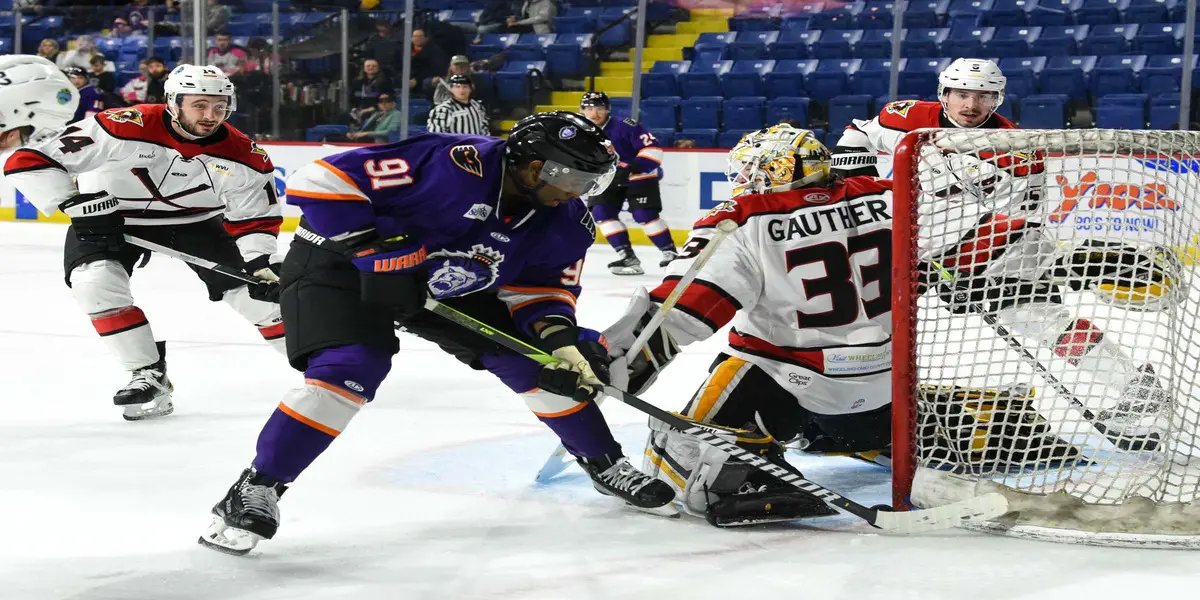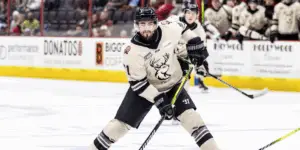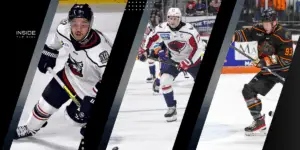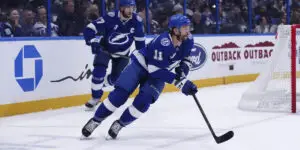
Yvan Mongo has made his name, especially within the Reading Royals base, as a fan favorite. Mongo has proven himself to be a crucial part to the team, and you know when he is not on the ice. Mongo sat down with Inside The Rink to talk hockey, his career, and his community program.
Playing In The Q
Before heading to college, Mongo played 4 full seasons in the QMJHL plus 5 games in the 2013-2014 season. He played for Blainville-Boisbriand Armada and Drummondville Voltigeurs. In his final season with Blainville-Boisbriand Armada and his lone season with Drummondville, He was awarded the “A” on his sweater. In his 234 game span in the QMJHL, Mongo tallied 52 goals with 69 assists. Mongo speaks on his time in the QMJHL and what it meant for him:
“It was good for me. I played there for four years. I was fortunate to play with a lot of good players that are still my friends to this day. I really had a great time play there. It helped me develop my game in many aspects. I wasn’t necessarily the most offensive player, so the defensive side of my game really go better when I played there. I played for great coaches and I just learned a lot overall.
College Life
Life after the QMJHL included University life for Mongo at the University of Ottawa. Mongo played in a total of 72 games with University of Ottawa and tallied 20 goals with 32 assists. Mongo was an International Management major during his time at University.
“USports was a special time for me. I think I went from being a kid/teenager to really becoming more of a man and I matured a lot. Being a university student and playing at the same time. One of the people that I considered my mentor was my coach there, Patrick Grandmaitre. I learned a lot from him and he really allowed me to become the person that I am now.
Off-Season Regimen
Every player has an off-season regimen to keep them in shape and ready for the next season. Mongo speaks on what his consists of:
“In the summer, I work out really hard. I work out five times a week and I’m on the ice twice a week. Some weeks it’s more than that. I focus a lot of lower body and conditioning because I feel the way I play, I rely a lot on my speed and my ability to play a relentless type of hockey. In season, because we are on the ice so often, I tone it down a little bit. About two workouts a week. I started doing Pilates this year.”
Model The Game
Current players tend to look to the players before them to model their game after, and also current players to study what they do. Mongo speaks on who he enjoys watching:
“I like watching Auston Matthews a lot and Tim Stützle. Matthews is the best goal scorer we have seen in a long time, probably since Ovechkin. He is just an electric type of player. He is the type of player that if you study, you can learn how to read the play and score more goals. With Stützle, he is just so fast and smooth with the puck in the edges.”
Coming Back From Injury
Injury can be hard on anyone, but especially athletes who play hockey because of the fast paced nature and long season. Mongo has had his fair share of injuries but has always come back stronger. He speaks on what he does to rehab from those injuries:
“I do a lot to take care of my body. So when I get injured, it’s really just unfortunate. I just do everything I can to get back on the ice as fast as I can. I work a lot with Sean (Berberich, Reading Royals Athletic Trainer), and some of my trainers back home in Montreal to make sure that we have the best information available as to what is the best plan of action. I feel like every time I’ve gotten injured, we did a great job for me to come back and still be the same player and even better than before. I think it’s just a matter of making sure I do everything in my power to get back and help the team.”
Pre-Game
Some players have a pre-game routine, some are just go with the flow. Mongo speaks on what he does pre-game to get himself into game mode:
“I feel like I used to have some but not really anymore. I don’t even sleep the same amount of time every day. I don eat necessarily as the same times every day. The only thing I do, is that I put the left piece of equipment every time before the right one. I started doing that a long time ago.”
In-Game Mindset
Having a positive in-game mindset is important for a player to produce on the ice and helps with team morale. Mongo speaks on what his in-game mindset is:
“I’m really focused on having fun when I’m playing. I just want to be aggressive and have the puck. I want to score goals. That’s what I enjoy most out of hockey. I’m not out there looking for confrontation. I feel like I’m a very composed person in general and that’s the way I play too.”
Accomplishing Outside Of Hockey
Playing professional hockey is a huge accomplishment. Players often have outside accomplishments that they hold in high regard. Mongo speaks on his:
“Getting my university degree. I was really proud of that. Even though I’ve always been a good student, I didn’t envision myself necessarily going through university. As a younger hockey player, I wanted to go right into the pros. My first two years at University, I didn’t enjoy studying as much, I was still having good grades and doing what I had to do. Third and fourth year is where I really grew and matured. I enjoyed the process of being a student and learning.”
Community Man
If Mongo is known for something, it’s his innate ability to be involved in the community and working for the positive change in the game, especially with kids who want to play. Mongo speaks on a program he started in college and is trying to continue through his professional career:
“The basis of it is just trying to be a force of positive change within my environment. I feel as a hockey player the best way for me to do it is through hockey and through the sport. The Brave Buddies program was really to bring kids from underserved communities to games and give them a great experience that’s hockey related. I know that being one of those kids, it’s not always easy. Being one of those minorities and sometimes feeling alone on your team, I went through it, I know how it feels. I know it’s not always easy. I know there’s microaggressions and sometimes it’s hard. It might be hard for them to talk about it with their environment with the people that are closest to them. I feel like for me, being someone that they might look up to or relate to, more than someone that doesn’t really understand what they’re going through, it might be easier for them to open up to me. It’s really an opportunity for me to give advice, listen to them, and hopefully just give them a great experience at a hockey game, show them around, and I’d love to make it grow. I have a hockey camp that I started two years ago that’s called Completing the Shift Hockey Camp, which has the same idea. I made that camp completely free. There is no barrier of entry to any kid that wants to participate in hockey. I think it is a great way to grow the game in general.”
Throughout this season with Reading, Mongo has played in 40 games. He has notched 12 goals and 13 assists.
Discover more from Inside The Rink
Subscribe to get the latest posts sent to your email.



